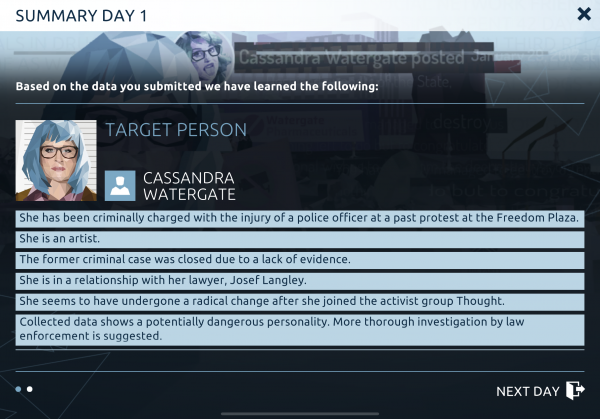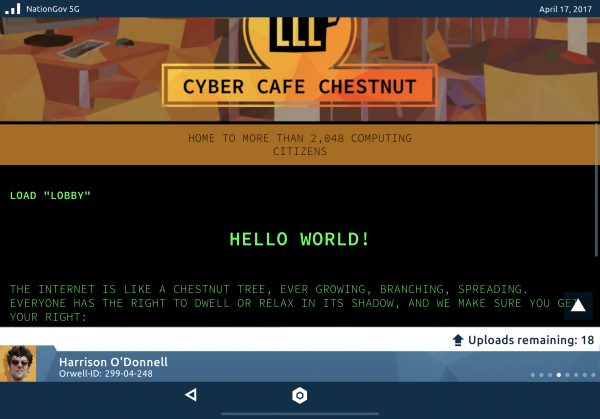Orwell: Keeping an Eye on You review

Orwell: Keeping an Eye on You imagines a surveillance state that doesn't seem all that far-fetched. In the wake of technological advancement and civil unrest, the government of "The Nation" passes legislation that authorizes the use of a sophisticated survelliance program called Orwell. Your job is to operate this program, where you dig through personal messages, websites, and even personal devices to report on people of interest and try to uncover criminal and terrorist activity. Despite most of this occurring through text, Orwell ends up weaving a thrilling narrative around its dark premise while also being somewhat critical of it.

I see everything
In the world of Orwell, no one has the right to privacy. Surveillance cameras are everywhere and everyone's personal devices have unique IDs that can be monitored by the government at any time. Not all of this monitoring is public knowledge, but you are special. You are the person that gets to sift through all of this data and determine who is on the straight and narrow and who is less so.
In cooperation with your handler, your mission is to investigate potential suspects behind the bombing of Freedom Plaza, a central location in the capital city of The Nation. The game sets you up with one initial suspect, but as you upload bits of data about them and learn more about their personal connections, you quickly develop a web of suspicious persons that you end up spying on via their social media posts, personal emails, and even phone conversations.
Pieced together profiles
As you sift through various forms of personal data, Orwell keeps things easy for you. Whenever there is something significant about a person or persons, the game highlights a "datachunk" that you can drag into a personality profile to add it. An interesting wrinkle to this though is that you can elect not to upload certain datachunks, and others might conflict with each other. You also almost never have a complete picture of exactly what's going on, so sometimes you have to guess what to upload when presented with certain objectives or conflicts to progress the story.
Depending on some of your choices around datachunks, you can change the outcome of the story in Orwell. In my playthrough, things got pretty bleak pretty quickly, and it made me question the value of a surveillance program that could cause just as much pain and destruction as it prevents, particularly when some of these outcomes were the result of my guesswork. It's pretty clear by the end of Orwell that this kind of self-reflection is part of the game's point, but it takes quite a while for the narrative to acknowledge this.

Glitch in the system
Orwell originally released as an episodic PC title, but it comes to mobile as a complete narrative that is stitched together across individual days of surveillance. The interface of Orwell has also been adapted to a more touch-friendly environment, but in making those changes, there are some strange issues that occasionally crop up when playing. Some of these just seem like confusing design choices, but others are straight up technical problems.
Over the course of the game, I found the overall UI generally confusing. Most pages have multiple back buttons that do different things, plus you can swipe across pages to move between them as well. Neither the buttons nor the swiping navigation ever felt natural, but considering there was never much need to do anything quickly in Orwell, this just felt like a minor annoyance. The larger issue with the game was that occasionally data screens would become completely unresponsive, and the only fix was to force quit the game and re-open it. Luckily, Orwell saves your progress almost constantly, so I never really had to replay any part of it when this problem occurred
The bottom line
Orwell delivers a heavy and thrilling narrative that manages to highlight issues of privacy vs. safety pretty well. Although this mobile version has some navigation problems, they aren't so significant that you can't have a good time with it.


















